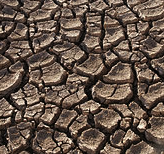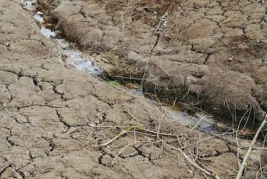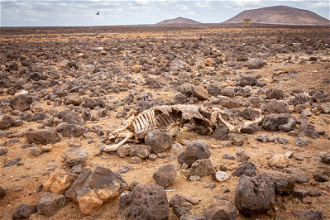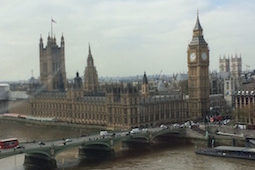South Africa: Running Water, Running Out.

Parched ground
South Africa is in the middle of one of the worst droughts in living history. Or if, like me, you were born in the 90s, the worst drought in living memory.
Our increasingly hot and dry summers, as well as the El Nino phenomenon - which has resulted in little rainfall over the last year or two - have left water levels in our dams at worrying levels. The drought may well not be the worst the country has ever experienced. However, the change in circumstances between now and the last El Nino event of similar severity (1982/3) means, the impact of the drought may well be more pronounced.
Firstly, there are significantly more people in the country than there were in 1982/3. According to the 1980 census, there were about 28,000,000 people living in South Africa when the last similarly severe El Nino event took place. With an estimated population of 55,908.900 as of July of this year, this represents a 99% increase in the number of people who have to be supported by a similarly scarce and rapidly depleting resource. Not only does there have to be enough water to drink, there has to be enough water to produce food for that comparatively massive number of people. Water shortages also mean food shortages.
With no end in sight to the population growth on this dry patch of Earth we call home, and the deterioration of our environment, the trend that sees more people to support, and less resources to support them, is sure to continue into our future.
Secondly, rapid urbanization, poor use of what little water we have, and aging infrastructure mean that water has to travel further, through leaky pipes, to a population that wastes it. This mistreatment of the planet's most precious resource needs to change or the impact of severe weather events will be increasingly dire.
The under-development of rural economies and the over-concentration of wealth and opportunity in the city makes urbanisation almost unavoidable. What we can avoid though is waste and mismanagement. Through planning and investment, the use of our water can be made more efficient. Whether the political will to proactively plan and invest in more efficient and innovative use of our water exists, is a question that ought to be directed at the state.
The government hasn't been invisible in this crisis though, with repeated calls to all South Africans to use water more sparingly and responsibly. That call has, however, largely fallen on deaf ears as gardens continue to be watered, swimming pools continue to be filled and taps are left to leak and drip in households and public places across the country. The result is that we can now all expect the government to enforce water restrictions in the near future.
This tendency to waste and abuse water, must however be viewed in the context of a larger ecological crisis, to which that we are hurtling at breakneck speed as a result of our inability to treat with respect the only planet in our solar system that can support us. If attitudes towards the planet don't change there soon won't be any people left to mismanage its gifts.
Follow the Jesuit Institute on twitter @JesuitInstitute
Source: Jesuit Institute, South Africa





















